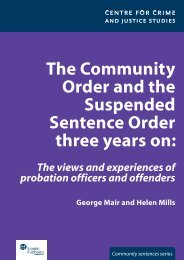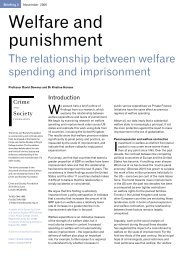PRISON SERVICE
PRISON SERVICE
PRISON SERVICE
- No tags were found...
You also want an ePaper? Increase the reach of your titles
YUMPU automatically turns print PDFs into web optimized ePapers that Google loves.
also have expectations about how you should betreated, which are legitimate’.So I was always very proud of that. I also felt thatwhat the office does in respect of prisons complaints,like all complaints agencies and all Ombudsmen, isabout helping the service whom you oversee, toimprove the quality of what it does. I have used thismetaphor before: if you think of the most successfulcommercial organisations, say Tesco, what is the firstthing you see when you walk in? It’s the customerservice desk, which is really the complaints desk,where you take back the fruit that was off when yougot home, or you’ve been over-charged on Till 13, oryou were supposed to get 2 for the price of 1 but youhaven’t. Why’s that the first thing you see? Becausethey are saying to you as a customer, you areimportant to us, you are entitledto be treated properly, but alsobecause they want to knowwhen those things are going on.If people are always being overcharged on Till 13, thensomething’s going wrong on Till13, and we want to change that.If you’re bringing back thebananas that have gone off bythe time you get home, wedon’t want to stock them fromthis supplier any more; and sothey’re using the complaint as away of improving servicedelivery.I remember a friend of minewho became a governor of whatwas then a rather notoriousyoung offenders’ institution (it’snow a rather better one and Iwon’t name it), saying to me that one of the indices ofhis success was that he was getting more complaints.And the reason for that is that the young men in theYOI, firstly they weren’t terrified of complaining,because they weren’t fearful of recrimination, andsecondly they had an expectation that if theycomplained something might actually be done aboutit. There is a perverse aspect to complaints, that ifyou’ve got a really bad institution, you don’t get anycomplaints, because nobody expects anything to beput right. If you have an excellent institution, youprobably get quite a few complaints, because peopleare confident that something will be done to putmatters right. So I think those things are worthrepeating.MK: Then deaths in custody became a majorpart of your remit.SS: It was incredibly worthwhile when in 2004we took on the death in custody remit. The ability toThere is a perverseaspect tocomplaints, that ifyou’ve got a reallybad institution, youdon’t get anycomplaints,because nobodyexpects anything tobe put right.tell people’s story, the opportunity to engage with thebereaved, the ability to change things hugely for thebetter for prison staff — in 2004 you got hardly anysupport, if someone died in prison it was all verymacho, you went back to work the next day and noone seemed to care very much. Family liaison wastransformed in the prison service, largely I think as aconsequence of the Ombudsman’s office’s work. Andof course, whether it’s directly related or coincidental,the very substantial reduction in the rate and overallnumber of self-inflicted deaths in prison. That is workof huge public value, of which I am very proud.Running round Fleet Street is trivial — what is moreephemeral than a press notice? — compared tohelping to drive down avoidable deathsMK : Did those changes come about throughthe fear of consequences, ofinvestigations if peopledidn’t open the ACCT and soon, or do you think your rolewas positive?SS: I think this has beenunacknowledged by politicians— the extent to which theprison service acknowledgedthe value of independentinvestigation (and it benefitednot least because it involvesindependent validation of whatthings are done well). But it isalso a way of drivingimprovements in performance. Ihad huge encouragement fromthe service in carrying out thisdeath in custody work. Whenwe first started of course therewas some unease — that’s onlynatural. But over the six years when I was personallyresponsible for about 1000 investigations, there washuge support first from Martin Narey and then fromPhil Wheatley — and from everybody lower down thefood chain. In some sense it goes back to my personalapproach as a pressure group activist, which was thatI always preferred to work with the grain rather thanagainst it. And I was very fortunate that theleadership of the service wanted to go in the samedirection that I did. I don’t think it’s telling tales out ofschool, that Phil Wheatley, just before his retirement,when he was responsible for NOMS and with all themeetings with MoJ that he had to spend a lot of histime doing, would personally read some of our deathin custody reports. Now that tells you a huge amountabout him as an individual, it tells you about thesignificance that he attached to what we were doing,and it tells you a lot about the impact of the work forwhich I was responsible.40 Prison Service JournalIssue 192











